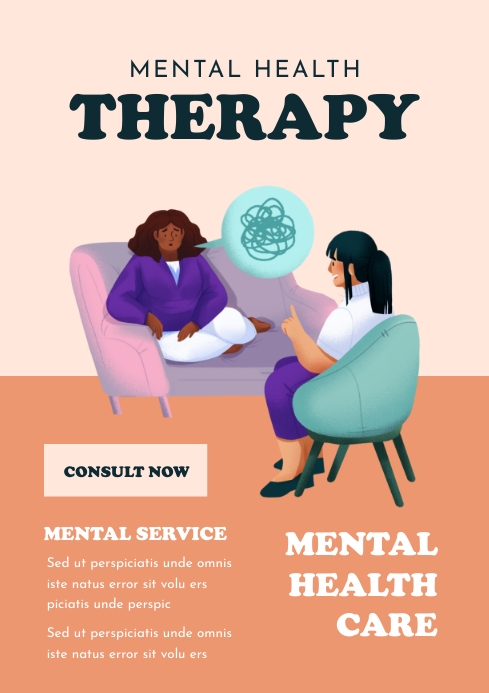Unlocking the Secrets of Mental Health: A Summary of Counseling and Therapy Options
Psychological health is a complex and vital aspect of total well-being. Numerous therapy and treatment choices exist to resolve numerous psychological obstacles. Each technique provides unique advantages and methods customized to individual demands. Understanding these alternatives is vital for anyone seeking to improve their mental health. Cognitive Behavioural Therapy. What factors should one take into consideration when discovering these avenues? The response may disclose a path to a healthier emotional state
Comprehending Mental Health and Its Relevance
Psychological health and wellness incorporates the psychological, mental, and social well-being of people, substantially affecting exactly how they think, really feel, and act. Its importance can not be overemphasized, as it affects every element of life, consisting of partnerships, work efficiency, and total lifestyle. People with great mental wellness tend to handle anxiety better, maintain much healthier relationships, and make educated decisions. On the other hand, bad mental health and wellness can cause emotional distress, damaged functioning, and different mental illness, which may require specialist intervention. Understanding psychological health is important for identifying the signs of distress and the demand for assistance. Understanding additionally advertises compassion and decreases stigma, motivating people to seek assistance when required. By prioritizing mental health, neighborhoods can cultivate environments that support emotional wellness, eventually bring about much healthier, more resilient people. This foundation serves as a vital step toward effective psychological health therapy and treatment alternatives.
Kinds of Therapy Approaches
Counseling strategies vary widely, each customized to satisfy the special requirements of individuals looking for support. Amongst the most common kinds are cognitive-behavioral treatment (CBT), which concentrates on recognizing and altering adverse idea patterns, and person-centered therapy, which emphasizes compassion and approval. Psychodynamic treatment explores unconscious procedures and past experiences to recognize current behavior, while solution-focused brief therapy intends to recognize options rather than check out problems.Additionally, household treatment addresses relational dynamics and interaction within families, promoting healthier communications. Team counseling gives a common room for participants to share experiences and support one an additional. Other strategies consist of existential treatment, which encourages people to discover definition and objective, and art or songs treatment, which utilizes imaginative expression as a restorative device. Each technique offers unique methods and viewpoints, enabling customers to find one of the most suitable technique for their individual development and recovery trips.
Exploring Various Treatment Methods
In the domain of psychological health and wellness counseling, numerous therapy modalities supply distinct techniques to treatment. Cognitive Behavioral Treatment emphasizes the connection in between actions and thoughts, while Psychodynamic Therapy discovers unconscious influences on emotional well-being. In Addition, Mindfulness-Based Methods advertise present-moment awareness as a way to improve emotional policy and total mental health and wellness.
Cognitive Behavior Therapy
Cognitive Behavior Modification (CBT) stands out as one of the most commonly exercised and looked into methods in mental health therapy. This strategy focuses on the affiliation between actions, feelings, and ideas, emphasizing that modifying negative idea patterns can lead to enhanced psychological well-being and behavior modifications. CBT is structured, commonly entailing a restricted variety of sessions, and aims to outfit people with practical skills to handle their symptoms. It is efficient for a selection of conditions, consisting of anxiousness disorders, clinical depression, and trauma. By utilizing methods such as cognitive restructuring and exposure treatment, CBT promotes strength and equips clients to face difficulties head-on, making it a beneficial choice in the landscape of psychological health and wellness therapies.
Psychodynamic Treatment Techniques
Psychodynamic therapy strategies provide a deep expedition of the unconscious mind and its influence on actions and emotional well-being. Rooted in Freudian theory, these approaches highlight the importance of early youth experiences and unconscious disputes. Via strategies such as free association, dream evaluation, and transfer, people get insight into their sensations and ideas, promoting self-awareness and understanding. This restorative technique urges clients to reveal quelched feelings and unsettled concerns, which can be critical in resolving current psychological challenges. By checking out the interplay between existing behaviors and previous experiences, psychodynamic therapy aims to advertise psychological healing and individual development. Inevitably, it provides a structure for individuals to explore complex inner dynamics that influence their mental health and wellness.

Mindfulness-Based Techniques
While standard treatments usually focus on past experiences, mindfulness-based strategies focus on present-moment awareness as a path to emotional well-being. These approaches, including mindfulness-based cognitive therapy (MBCT) and mindfulness-based anxiety reduction (MBSR), motivate individuals to engage completely with their thoughts and sensations without judgment. Practitioners find out to observe their mindsets, promoting a better understanding of psychological triggers and reactions. This technique not only minimizes symptoms of anxiousness and clinical depression but likewise enhances overall psychological strength. By incorporating mindfulness exercises, such as reflection and deep breathing, clients cultivate a feeling of peace and quality. Inevitably, mindfulness-based strategies encourage people to navigate life's obstacles with enhanced understanding and acceptance, promoting a healthier partnership with their ideas and feelings.
The Duty of a Specialist or Therapist
A skilled therapist or therapist plays an essential role in supporting individuals via their mental health and wellness journeys. They give a secure, non-judgmental area where customers can share their thoughts and feelings freely. Couples Therapy. By employing numerous healing methods tailored to each individual's needs, specialists aid customers explore underlying problems that might add to their mental wellness challenges.Therapists use advice and devices to deal with tension, anxiety, clinical depression, and various other psychological troubles. Their training outfits them to identify patterns in habits and believed procedures, facilitating insights that bring about individual development. They additionally foster a solid therapeutic alliance, which is vital for effective outcomes.Moreover, specialists stay fully commited to privacy and moral standards, making certain a trusting environment. Inevitably, the role of a specialist or therapist is to encourage people, encouraging them to establish strength and much healthier coping methods while steering with life's intricacies
How to Choose the Right Counseling or Treatment Choice
Picking the best therapy or treatment alternative starts with reviewing individual needs. It is important to understand individual obstacles and goals before checking out numerous treatment designs. This fundamental action can substantially affect the efficiency of the picked strategy.
Evaluate Your Needs
Exactly how can individuals effectively evaluate their psychological health needs when assessing counseling or therapy alternatives? They must mirror on their psychological state and identify specific problems, such as clinical depression, stress and anxiety, or relationship difficulties. Journaling can be a useful device for tracking have a peek at these guys thoughts and sensations over time. In addition, individuals might take advantage of seeking comments from trusted pals or relative pertaining to viewed changes in actions or mood. It is likewise valuable to review individual goals for treatment, such as improving coping skills or obtaining insight right into personal patterns. Looking into various counseling techniques and their suitability for specific needs can assist in making an informed option. Eventually, self-awareness plays a pivotal duty in selecting the best course for mental health support.
Explore Therapy Designs
While passing through the diverse landscape of therapy choices, people ought to consider various designs of counseling to discover the most effective suitable for their one-of-a-kind requirements. Cognitive Behavioral Therapy (CBT) concentrates on altering adverse thought patterns, while Psychodynamic Therapy discovers subconscious procedures and past experiences. Humanistic strategies emphasize individual growth and self-actualization, promoting a supportive setting. In addition, mindfulness-based therapies grow present-moment awareness, aiding psychological guideline. For those looking for structure, Solution-Focused Short Therapy targets particular goals and services. Team treatment supplies a common setting for common experiences and support. Eventually, individuals should certainly review their choices, convenience levels, and certain challenges, ensuring they choose a healing design that resonates with their individual trip toward mental health.
Getting Rid Of Barriers to Looking For Aid

The Advantages of Counseling and Treatment for Mental Health
Looking for assistance for psychological view website health and wellness challenges can bring about substantial renovations in total health. Counseling and therapy offer people with a secure space to explore their thoughts and feelings, promoting self-awareness and personal development. These expert services outfit customers with dealing strategies and analytic abilities customized to their distinct situations.Moreover, therapy can lower signs of anxiousness, anxiety, and other mental wellness disorders, boosting psychological strength. Regular sessions advertise responsibility and motivate people to set and achieve individual objectives. Through different healing techniques, such as cognitive-behavioral therapy or mindfulness practices, clients discover to reframe negative ideas and establish much healthier behaviors.Additionally, the therapeutic relationship itself can be a source of support, helping to battle isolation and solitude. Generally, participating in counseling and treatment is a proactive step towards attaining mental wellness, enabling individuals to lead even more satisfying lives.
Often Asked Questions
How Much Time Does Counseling or Therapy Commonly Last?
The period of therapy or therapy differs substantially, commonly lasting from a few sessions to several months or years. Factors affecting this include the person's specific requirements, the type of treatment, and healing goals.
What Should I Anticipate During My Initial Session?
Throughout the first session, individuals can anticipate an intro, conversation of issues, and the therapist's approach. They may complete analyses and develop objectives, cultivating a secure environment for open interaction and structure connection.

Are There Any Type Of Risks Related To Therapy?
Treatment can include threats, such as emotional discomfort, vulnerability, or facing painful memories. While these challenges may develop, they can likewise bring about personal development and recovery, making the therapeutic procedure complex yet potentially rewarding.
How Can I Inform if My Specialist Is an Excellent Fit?
Determining if a therapist is a good fit includes you could try here reviewing convenience, interaction design, and healing strategy. Favorable relationship and development in the direction of objectives are signs of an appropriate match, crucial for reliable psychological wellness support.
Will My Insurance Cover Therapy or Treatment Sessions?
Determining insurance protection for therapy or therapy sessions typically needs calling the insurance policy company straight. Plans differ substantially, so people should confirm benefits, co-pays, and any kind of needed pre-approvals before going after treatment solutions. Among the most typical kinds are cognitive-behavioral therapy (CBT), which concentrates on identifying and changing adverse thought patterns, and person-centered therapy, which stresses empathy and approval. Psychodynamic therapy discovers past experiences and unconscious procedures to comprehend existing actions, while solution-focused short therapy aims to determine services rather than examine problems.Additionally, family therapy addresses relational dynamics and interaction within families, cultivating much healthier communications. Various other techniques consist of existential treatment, which encourages people to discover meaning and function, and art or songs therapy, which makes use of imaginative expression as a restorative tool. Cognitive Behavior Therapy emphasizes the link in between ideas and behaviors, while Psychodynamic Treatment discovers subconscious influences on psychological wellness. Cognitive Behavioral Therapy (CBT) concentrates on changing adverse thought patterns, while Psychodynamic Treatment explores previous experiences and subconscious procedures.
Comments on “Marriage Counselling Success Stories: What Changed Their Relationship”